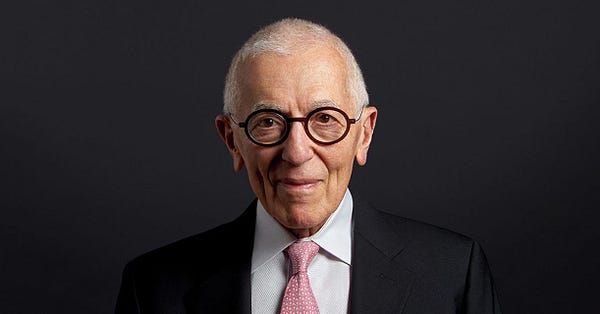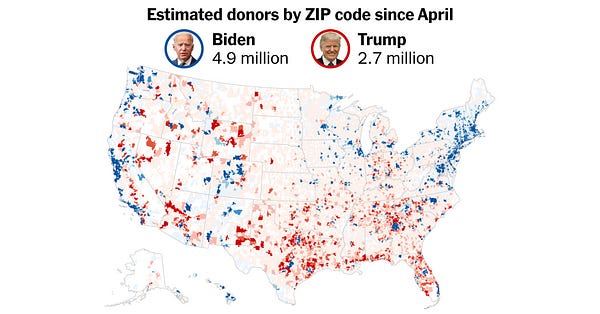🤦When Ad Agencies Implode - The Neal Ungerleider Newsletter
Richards Group fallout + map nerdery + AI & Alzheimer's + more!
I’ve been thinking a lot about the Richards Group ad agency crapshow lately.


Backstory, for folks not in the advertising world:
The Richards Group is a large advertising agency in Dallas that dominates Dallas’ advertising industry and plays a prominent national role. It’s anomalous in the sense that it’s still owned by 88-year-old founder Stan Richards rather than one of the handful of holding companies that own the vast majority of agencies. However, it’s normal in the sense that it’s very much an anchor for the regional ad industry around it.
It’s not an exaggeration to say that if you’re in advertising and live in Dallas, you’ve probably worked with Richards or had a supervisor who worked at Richards at some point.
Anyway, Stan Richards did something amazingly racist and amazingly stupid during a recent internal meeting on Zoom: referred to a potential campaign for client Motel 6 as “too black” and then explained that the campaign would offend Motel 6’s “white supremacist” guests.
Within days of the ad agency’s CEO calling a campaign too black and saying his client serves a white supremacist customer base, The Richards Group’s business imploded. Motel 6, understandably, terminated their relationship with Richards. So did Home Depot, H-E-B (a huge deal in Texas), Keurig-Doctor Pepper and the Salvation Army.

(Image via GIPHY)
Richards stepped down, but the damage was done. The Richards Group is believed to have lost approximately 40% of its business and will almost certainly need to lay off staff. Like other medium and large size ad agency, their lost business causes a ripple effect: Ad agencies depend on an external vendor and freelance community that offers assistance with everything from production to graphic design to copywriting to strategy to web design. The Richards Group’s loss is a loss for their vendors, too.
And the shitshow is amplified by specific factors. Ex-Richards Group employees dished on the company’s odd internal culture in a massive Reddit thread on /r/dallas, and it’s something. Judging from the Reddit thread, the company’s culture is unique. This shows up in both relatively innocuous ways (an obsession with showing up to work on time, which is… unusual for the advertising industry!) and more worrying (misogyny and a “cult-like office environment”).
Meanwhile, I’m chewing through two specific things here, notwithstanding the we-don’t-even-need-to-say-it fact that his comments were racist and unjustifiable in any context:
Stan Richards is by no means the first or last advertising exec to say something startlingly racist and inappropriate in an internal meeting.
An 88-year-old founder taking an active role in an internal meeting made comments that simultaneously tanked his business, put hard-working employees out of work, gave clients a chance to cut their ad budgets in the middle of a recession, and tarnish the reputation of the business he built from the ground up.
You see… the fundamental dissonance in the advertising world is that while it’s filled with men and women who consider themselves bold, creative individualists, advertising agencies themselves are highly collective entities. The creatives don’t get anywhere without production who doesn’t get anywhere without account who doesn’t get anywhere without strategy who doesn’t get anywhere without admin.
This is all a lot of words to say that, yes, a founder saying something grossly offensive in an internal meeting can threaten his employees’ jobs and the ad industry in his whole city for no particularly good reason.
Further reading: Clients leave Campbell Ewald over racist email controversy, The Richards Group Incident Is Advertising’s Diversity Deja Vu.
Completely switching over to something else, wanted to point out two mapping projects I recently stumbled on:

The Distressed Community Index from the Economic Innovation Group lets you look up individual ZIP codes to see where they stand on a five-tier scale of economic prosperity. It also includes metrics such as racial composition, types of jobs people in the area work, educational attainment, etc. Where did you grow up? What towns/cities formed you? Where do you live now? It’s all there for the United States.
The New York Times’ map of donations to the Trump and Biden campaigns based on Federal Election Commission data. None of the map is much surprise but the visualizations are so fucking interesting to see. Staten Island, where I grew up, is a Trump Red island in a sea of New York/New Jersey Biden Blue; my current neighborhood in Chicago is part of a solid Biden bloc that pretty much hugs Lake Michigan’s southern coasts. See what you find.
New Futures:
Scientists are working on some amazing projects, and AI tools that can detect future onset of Alzheimer’s Disease ~7 years in advance are very much part of that.
Zeynep Tufecki, who’s probably our best living writer on complicated systems IRL, has started a great newsletter called Insight.
Advertising/Marketing/PR:
Good industry news! Omnicom is ending voluntary pay cuts.
Brand expansion - Arby’s is opening in Mexico.
In possible bad news for Arby’s, Mexico is requiring warning labels on food with excessive sodium.
Garrett Johnson on the future of adtech is necessary Twitter reading.


Expensify CEO David Barrett emails 10 million customers to tell them to vote for Biden. Come for the (accurate!) argument that a second Trump term is disastrous for the United States, stay for all the earned media they accumulated. (Disclosure: I wrote about Expensify for Reuters in 2013, the same year that the Atlantic published this article about the current president.)
Facebook global ad chief Carolyn Everson talks about the aftermath of this summer’s Facebook ad boycotts.
Love this infographic of 29 psychological tricks used to get people to buy more things.
Must-read Frederic Filloux profile of venture capital firm A16z’s editorial operations, including their popular podcasts. Money quote: “A16z podcasts are edited like a great plastic surgery, you can’t see the nip and tuck. Montage and structure are key elements to deliver the highest value to the listeners.“
Behind the boom in tech companies issuing credit cards: As Shakeel Hashim puts it, “Unlike challenger banks, it's very cheap for tech companies to get their customers to try these products.”
Amazon launching a virtual escape room.
Airbnb releasing a free, open-source toolkit for illustrators and freelance creatives called Tyrus that guides them through the process of collaborating with clients. (Disclosure: Airbnb is a former client.)
Inside Martha Stewart’s new career as a CBD influencer.
Media:
Alexandria Ocasio-Cortez and Ilhan Omar attracted 400,000 viewers to a live Twitch stream of them playing Among Us. There’s a lesson here about how to reach out to younger voters for every politician, but let’s be honest… they’re probably not taking notes when they should be.
Mother Jones EIC Clara Jeffery’s reaction to finding out about Facebook algorithms that (allegedly!) downplayed sending traffic to them in favor of more right-wing news sources.


Quibi is shutting down after six months and their short-form video is apparently just too beautiful for this world. Lessons from Go90, apparently, were just not learned.
Rob Walker wrote this great profile of Nick Quah, the Idaho-based newsletter author who’s become one of the podcast industry’s leading experts.
Wired’s Kate Knibbs digs into the future of ClickHole, an extended meat joke turned one of the internet’s best humor sites (and our neighbors!).
The mash-up we always needed: Masha Gessen discusses Borat.
Tech:
Google, which has never met a product shutdown they didn’t like, is discontinuing Google Hangouts. Shutdown date TBD.
Biz Carson digs into the pitch deck’s future.
Apple kremlinology is fascinating kremlinology so let’s dive deep into Apple’s business relationship with Verizon.
Job listings indicate Amazon’s expanding into telemedicine.
The $3300 Cluvens Scorpion Computer Cockpit is the Ferrari of office chairs.
Fun:
Vulture’s Jen Chaney digs into how 1980s animated music videos like Dire Straits’ Money For Nothing and A-Ha’s Take On Me were made.
The real-life places that inspired HBO’s Lovecraft Country.
Things I’ve Enjoyed Lately:
This animated look at sci-fi author Philip K. Dick’s career.
That’s it for this issue. Email me here and please don’t hesitate to contact if I can be of assistance. Thank you for taking the time to read this damned thing. And donate to the Greater Chicago Food Depository.
Love and coffee,
Neal
About This Newsletter: My name is Neal Ungerleider, and I’m a strategic communications consultant working with brands and agencies on marketing/advertising/PR projects. I worked as a journalist in a previous life and now write this weekly newsletter about the comms industry and adjacent things. Thanks for taking the time to read it. For more, here's my bio, my portfolio, and current projects.
Connect on Twitter or LinkedIn and learn more about my services at nealungerleider.com. Contact me by replying to this newsletter or emailing neal@nealungerleider.com.







